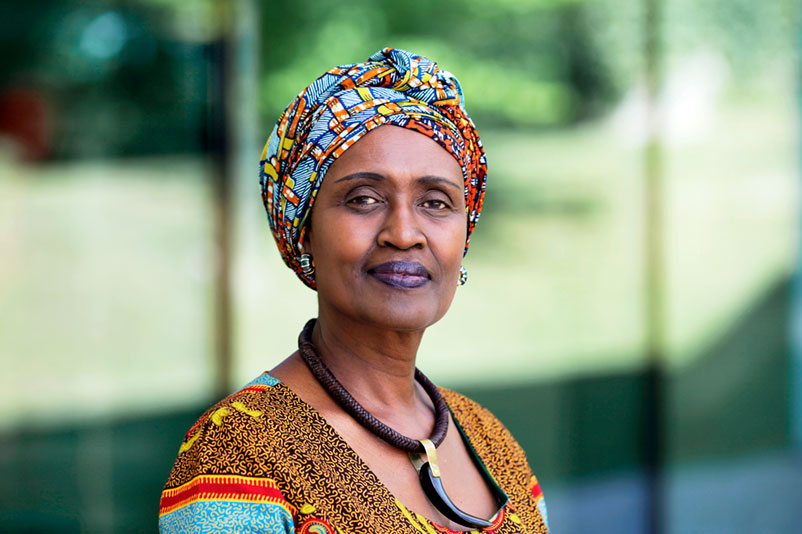The COVID-19 pandemic has changed our world immeasurably over the past six months.
I am proud that decades of experience in responding to HIV are being used in the response to the coronavirus, and that activists all over the world are working hard to make sure that the disruption to HIV services is minimized. This report profiles some activists, like Theary So from Cambodia who has been living with HIV for 15 years. Theary provides counselling services every day at the Khmer–Soviet Friendship Hospital in Phnom Penh, the country’s first HIV treatment site that is now being used to respond to COVID-19.
Our progress towards ending AIDS as a public health threat by 2030 was already off track before the COVID-19 outbreak. Now this crisis has the potential to blow us even further off course. Modelling conducted on behalf of UNAIDS and the World Health Organization has shown that a six-month disruption to medical supplies could result in an additional 500 000 AIDS-related deaths in sub-Saharan Africa alone by the end of 2021.
We cannot allow the hard-fought gains made in the HIV response to be reversed. Especially as there is still so far to go to finish the job.
Of the 38 million people living with HIV, 25.4 million people are now on treatment. That means 12.6 million people are still waiting. New HIV infections have been reduced by 23% since 2010, thanks in large part to a substantial decrease of 38% in eastern and southern Africa. But HIV infections have increased by 72% in eastern Europe and central Asia, by 22% in the Middle East and North Africa and by 21% in Latin America.
Globally, there were still 690 000 AIDS-related deaths in 2019 and 1.7 million new infections. Our 2020 targets of reducing AIDS-related deaths to fewer than 500 000 and new HIV infections to fewer than 500 000 will be missed.

Gender-based violence and inequalities continue to drive the epidemic. In sub-Saharan Africa, young women and adolescent girls accounted for one in four new infections in 2019, despite making up about 10% of the total population.
It is estimated that globally 243 million women and girls (aged 15–49 years) have been subjected to sexual and/or physical violence perpetrated by an intimate partner in the past 12 months. Meanwhile, we know that women who experience such violence are 1.5 times more likely to acquire HIV than women who have not experienced violence. Among marginalized groups, a high prevalence of violence is also linked with higher rates of HIV infection. Female sex workers have a 30-times greater risk of acquiring HIV than the general population.
We know how to treat HIV and how to prevent people from becoming infected. What we desperately need is a different politics to guarantee that everyone everywhere has the right to health.
This must include concerted efforts to dismantle the injustices and inequalities that put young women and girls, gay men and other men who have sex with men, sex workers, transgender people, people who use drugs, prisoners and migrants at greater risk of becoming infected with HIV.
The HIV prevention crisis must be tackled by granting everyone everywhere the right to health, tearing down the barriers that stop people receiving essential services. In tackling COVID-19, we must learn the painful lessons from a history of unequal access in dealing with HIV. Millions died of AIDS-related illnesses while there were medicines available that could have saved their lives. We must ensure that COVID-19 treatments and an eventual vaccine against the coronavirus are made available to everyone everywhere, free at the point of use. A People’s Vaccine.
We need a multisectoral response to HIV and other epidemics by making sure, for example, that boys and girls complete secondary education, that people are no longer criminalized for who they are or who they love, that there is a rights-based public health approach to drug use.
Successful pandemic responses must be rooted in human rights, be evidence-based, community-led and fully funded. We must learn the lesson once and for all.
HIV has been slipping down the international agenda for some years. That is why I am calling on leaders to come forward to support a United Nations General Assembly High-Level Meeting on Ending AIDS in 2021 to address with urgency the outstanding issues that are holding us back from ending the epidemic as a public health threat by 2030.
We must not drop the ball on HIV.
The UNAIDS 2020 global report is a call to action. It highlights the scale of the HIV epidemic and how it runs along the fault lines of inequalities. We can and must close the gaps.